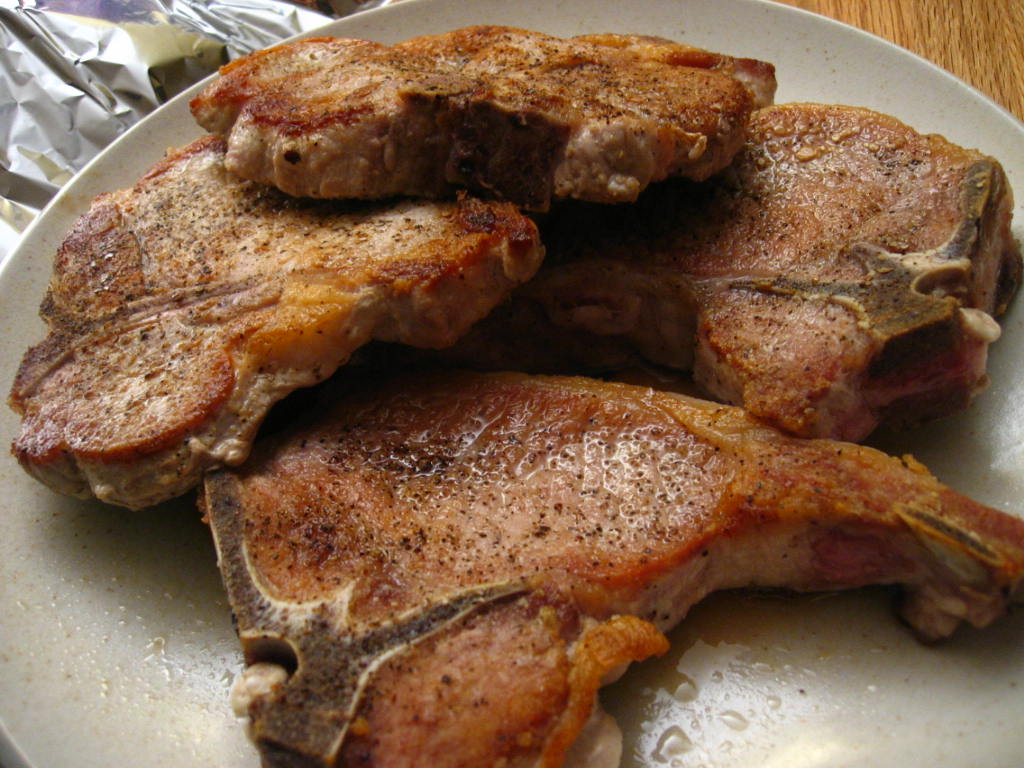Can Dogs Eat Pork Raw?

As the popularity of feeding a raw food diet for domesticated dogs increases, you may find yourself wondering what the downsides might be of letting dogs eat pork raw. Dogs are carnivorous by nature and most humans also enjoy a decent amount of meat in their diets. In fact, many people have fed their racing dogs or sled dogs a raw meat diet from birth.
With the increased awareness that commercial dog foods can be harmful to your dog, feeding a “raw diet” including meat, is becoming popular with other types of domesticated dogs. The biggest danger involved with letting dogs eat pork raw is parasites and worms that are often present in raw pork. Although much more dangerous for people, raw pork is dangerous for dogs for this reason.
If your dog does happen to eat pork raw or even pork that is not thoroughly cooked, they can get infected with Trichinella spiralis. This parasitic infection produces mild symptoms in your dog such as upset stomach, diarrhea, vomiting, and sometimes an elevated fever and lethargy as well as pain and stiffness. If you notice any of these symptoms, even mild ones after letting dogs eat pork raw, get them to a veterinarian for evaluation and treatment.
Can Dogs Eat Pork Cooked?
Okay, so we know now that raw pork for dogs is not a good thing at all, what about letting dogs eat pork cooked? It’s only natural that we would want to share one of our favorite foods with our dog, who is man’s best friend, right? Cooked pork is safe for dogs but only if it is plain pork cooked without all the seasonings and spices that humans tend to use when cooking pork.
In fact, what many people do not know is there are some spices, such as onion powder, garlic powder, and nutmeg, that are not only irritating to your dog’s digestive system, they are toxic if ingested. Some of these spices are often used on pork.
It’s also important to limit the condiments that your dog digests including barbecue sauce and others that are high in sugar, salt, and flavorings that could contain onion and garlic. So, if your dog happens to get his teeth onto a piece of cooked pork covered in barbecue sauce at the next family cookout, make sure you watch him closely for any signs of distress.
The other issue with cooked pork is that not all dogs can tolerate it well due to the high fat content. Watch your dog carefully for any change in bathroom behavior and in weight loss or gain to make sure they can tolerate cooked pork meat in their diet.
Can Dogs Eat Pork Bones Cooked?
Just like with any other cooked bones, when it comes to letting dogs eat pork bones cooked, the answer is a resounding no way. Cooked bones are bad for dogs but pork bones cooked are especially dangerous for dogs because they tend to be more brittle than many other types of bones. The danger with dogs eating pork bones cooked is that the bones will break and splinter in your dog’s mouth which can cause damage to gums, teeth, and even the throat or other internal organs during digestion.
Although your dog may have eaten pork bones cooked before without incident, it’s really a dangerous gamble every time. The one time that the cooked pork bone splinters the wrong way, you’ll find yourself rushing your dog to the vet and depending on the extent of the damage, it could cost your dog his life.
Can Dogs Eat Pork Bones Raw?
Raw bones for dogs are typically different than cooked bones. Dogs can eat raw beef, chicken, and lamb bones without much trouble if you supervise to prevent them from swallowing the bone. In fact, chewing on a raw bone can be beneficial for your dog as it can help clean their teeth and exercise their mouth muscles.
But letting dogs eat pork bones raw is not only not recommended, it is downright dangerous for your dog. Pork bones, unlike other bones, are more prone to breakage and splintering even when raw. Letting dogs eat pork bones raw therefore can be extremely dangerous because your dog can not only choke on the bone but they could swallow the bone and become constipated or worse, the bone could break and splinter in their mouth and cause damage to teeth, gums, or the throat and stomach.